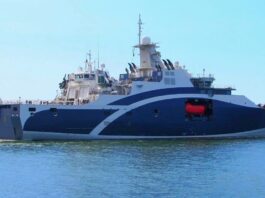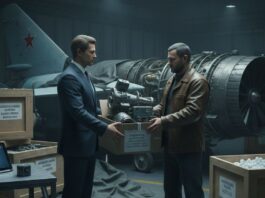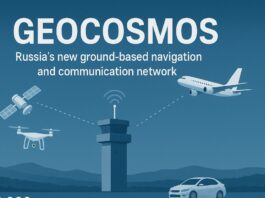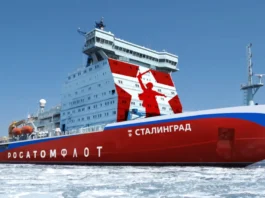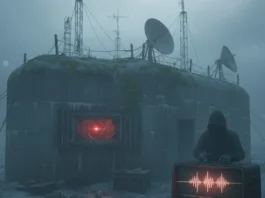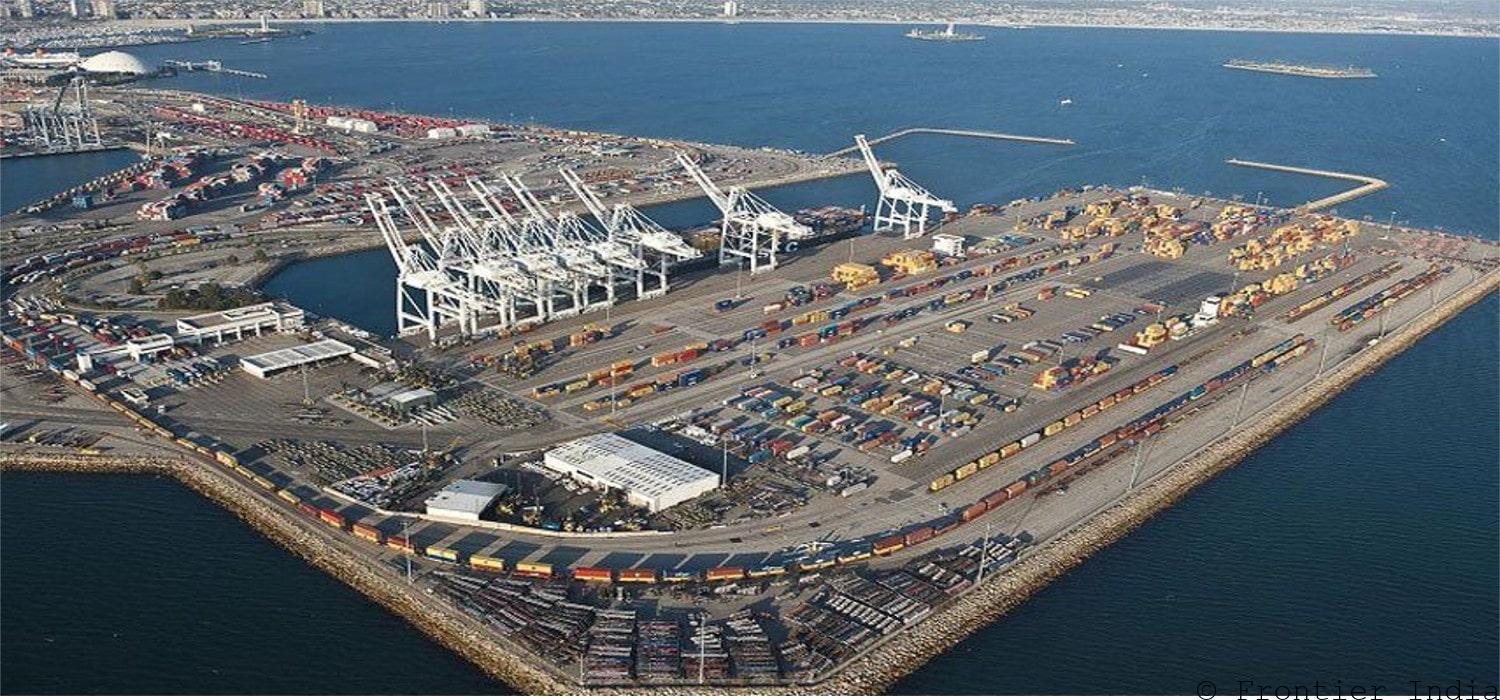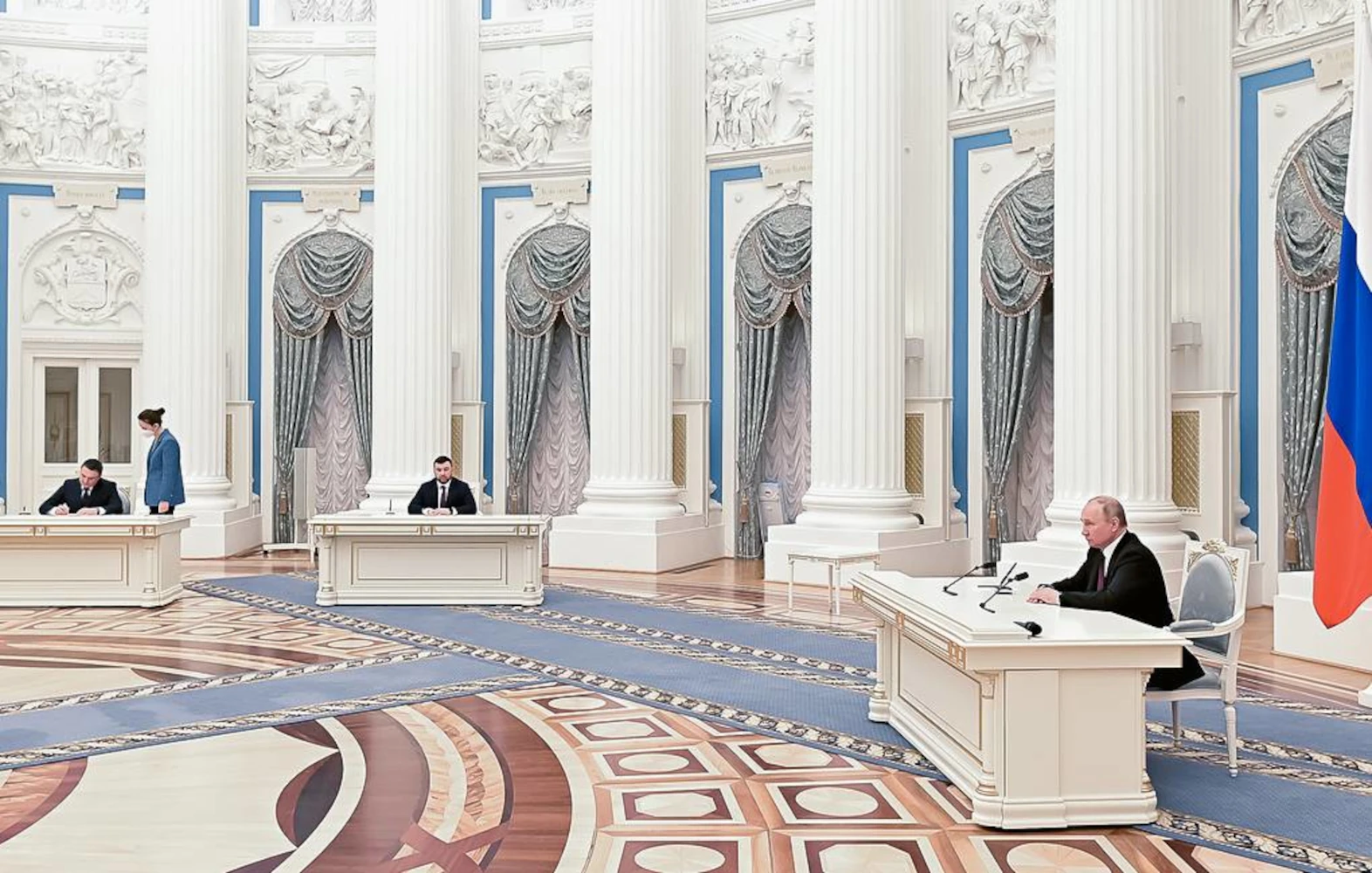
At a ceremony in the Kremlin on February 21, Russian President Vladimir Putin signed decrees recognizing the Donetsk and Luhansk People’s Republics (DNR and LNR).
Speaking before this in a televised address to the Russian, he said, “I consider it necessary to make a long overdue decision – to immediately recognize the independence and sovereignty of the Donetsk People’s Republic and the Luhansk People’s Republic.”
After signing the decrees, Putin and the head of the DPR, Denis Pushilin, signed an agreement on friendship, cooperation and mutual assistance between the Russian Federation and the Donetsk People’s Republic. Then Putin and the head of the LPR Leonid Pasechnik signed a treaty of friendship, cooperation and mutual assistance between the Russian Federation and the Luhansk People’s Republic.
The ceremony was held in the Catherine’s Hall of the Kremlin, where a meeting of the Security Council of the Russian Federation had previously taken place. Members of the Russian Security Council spoke in favour of recognizing the independence of the DNR and LNR.
A large number of armoured vehicles were seen on the territory of the Donetsk People’s Republic (DPR). As eyewitnesses told Interfax, two columns of armoured vehicles are on the territory of the DPR and follow to the north and west of the republic.
Details of the Russian recognition
According to draft law No. 75578-8, published on the State Duma of the Russian Federation website, after signing, both contracting parties receive the right to “build, use and improve military infrastructure, bases and other facilities on their territory.”
Kremlin has already ordered Russian troops to deploy peacekeepers in two districts in anticipation of a formal agreement on military cooperation.
Another article of the treaty (Article 11) provides for the free movement of citizens between Russia and the republics, for which a set of measures will be developed to regulate the regime of entry/exit of citizens of third countries.
The treaty obliges the parties to protect the “ethnic, linguistic, cultural and religious identity of national minorities on their territory and create conditions for the preservation and development” of this identity while guaranteeing the individual and collective rights of minorities “without any attempts to assimilate against their will”.
Reaction in DPR and LPR
Street celebrations erupted in the self-proclaimed republics of Donbass late on Monday after the Russian recognition.
After the broadcast of the ceremony of signing agreements with the heads of the DPR and LPR, fireworks lit up the sky over Donetsk and Lugansk. People took to the streets, waving Russian flags; the Russian anthem sounded everywhere.
LDNR has been in turmoil for eight years. Now the Russian armed forces will perform the function of maintaining peace in the republics.
Ukraine’s military intervention in DPR and LPR
The situation on the line of contact in Donbass escalated on February 17. The DPR and LPR reported heavy shelling by Ukrainian security forces, including heavy weapons. At the same time, Kiev announced the shelling of the positions of the Armed Forces of Ukraine. The leadership of the DPR and LPR had announced the temporary evacuation of citizens to the Rostov region in view of the threat of Ukraine’s invasion.
Ukraine reacts
President of Ukraine Volodymyr Zelensky assured fellow citizens that the country’s borders are reliably protected. Reacting to the Russian recognition of DPR and LPR, Zelensky said, these regions are part of the internationally recognized borders of Ukraine. Kiev remains faithful to the peaceful diplomatic path of resolving the armed conflict in Donbass “and will follow them and only them,” the Ukrainian president stressed.
He termed the Russian recognition as a “violation of the sovereignty and territorial integrity” of Ukraine, and recognizing the separatists means Russia unilaterally exiting the Minsk agreements and ignoring the decisions taken in the Normandy Format.
The separatist republics have been the bone of contention between Russia and Ukraine since 2014.
U.S. sanctions DPR and LDR
U.S. President Joe Biden signed a decree on sanctions connected with Russia’s recognition of the Donetsk and Luhansk People’s Republics.
The decree notes that new investments in the DPR and LPR are prohibited; export, re-export, sale or supply from the United States of any goods to these regions, as well as the import of goods, services or technologies from them; any U.S. approval, funding or assistance in the DPR and LPR.
“I signed an executive order to deny Russia the opportunity to profit from its blatant violations of international law. We continue to consult with allies and partners, including Ukraine, on the next steps,” wrote POTUS Joe Biden on Twitter.
U.S., Europe, Turkey and Japan in a huddle
The U.N. Security Council will meet urgently to study the situation in Ukraine. The Russian mission to the U.N. reported on its Twitter account that the meeting would take place at 9:00 p.m. local time in New York (02:00 GMT on Tuesday 22), something very unusual not only because of the night hours but also because of the urgency of its call.
The U.S. and its allies have condemned the Russian move and plan to impose sanctions on Russia.
U.S. President Joe Biden conveyed to his Ukrainian counterpart Vladimir Zelensky that Washington plans to introduce sanctions against Moscow, says the White House press.
President Biden reiterated that the United States would respond swiftly and decisively, in lock-step with its Allies and partners, to further Russian aggression against Ukraine.
The February 21 statement by President Ursula von der Leyen of the European Commission and President Charles Michel of the European Council says, “The Union will react with sanctions against those involved in this illegal act.” Europe is worried about the stoppage of Russian gas, and Germany is interested in actively negotiating between Russia and Ukraine due to its stake in Nord Stream 2.
Yaroslav Bashta, a member of the Foreign Affairs Committee of the Czech Parliament, told Ria Novosti that Russia’s recognition of the independence of the LPR and DPR narrows a possible war to the limits of a local one. He said that Russia has forces peace on Ukraine.
Bashta said if Zelensky starts fighting, he can remain for a second term as president of Ukraine. If he does not take such actions, then Zelensky will have to leave the post of head of the country because “he does not have any serious achievements in this capacity,” the Czech politician noted.
Japan is mulling stopping the high tech trade with Russia, especially the semiconductors. However, according to a poll conducted jointly by the Sankei newspaper and the FNN television channel, Japan is divided over the sanctions on Russia. 43.9% of respondents favoured imposing sanctions, while 44.1% were against it.
